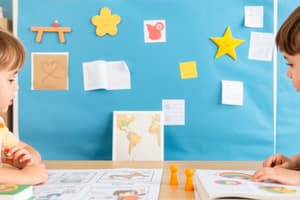Podcast
Questions and Answers
What is one key purpose of reflective practice for educators?
What is one key purpose of reflective practice for educators?
- To ensure uniformity in teaching methods across all schools.
- To make well-informed decisions and plans. (correct)
- To minimize the involvement of parents and families.
- To focus solely on administrative tasks.
Which type of reflection helps educators adapt their practices in real-time?
Which type of reflection helps educators adapt their practices in real-time?
- Reflection IN action (correct)
- Reflection ON action
- Reflection FOR action
- Reflection AFTER action
Which of the following is NOT a focus of reflective practice?
Which of the following is NOT a focus of reflective practice?
- Making impulsive teaching decisions. (correct)
- Being accountable to families and communities.
- Evaluating changes in practices and policies.
- Improving learning experiences for children.
How does reflective practice benefit educators' accountability?
How does reflective practice benefit educators' accountability?
What is a common aspect of the reflective practice cycle?
What is a common aspect of the reflective practice cycle?
What is a key theme in the planning processes for Early Childhood education?
What is a key theme in the planning processes for Early Childhood education?
Which approach emphasizes the role of the environment in a child's learning?
Which approach emphasizes the role of the environment in a child's learning?
What is an important consideration when planning for early childhood education?
What is an important consideration when planning for early childhood education?
Which of the following is NOT a focus of the Reggio Emilia approach?
Which of the following is NOT a focus of the Reggio Emilia approach?
In the context of planning processes in Early Childhood, what do the Kindy Guidelines refer to?
In the context of planning processes in Early Childhood, what do the Kindy Guidelines refer to?
Which of the following best describes the term 'Emergent Curriculum'?
Which of the following best describes the term 'Emergent Curriculum'?
What role do teachers play in the Reggio Emilia approach?
What role do teachers play in the Reggio Emilia approach?
Which of the following features is associated with the '100 languages of the child' concept?
Which of the following features is associated with the '100 languages of the child' concept?
What is the primary purpose of Wall Stories in education?
What is the primary purpose of Wall Stories in education?
Which of the following is NOT mentioned as a means of recording children's learning?
Which of the following is NOT mentioned as a means of recording children's learning?
How do Classroom Diaries contribute to children's learning?
How do Classroom Diaries contribute to children's learning?
What role do Floor Books play in children's education?
What role do Floor Books play in children's education?
Which of the following materials is often created by educators to document children's learning?
Which of the following materials is often created by educators to document children's learning?
Which of the following is a product used to record children's learning and development?
Which of the following is a product used to record children's learning and development?
What is a benefit of using Classroom Diaries for children and families?
What is a benefit of using Classroom Diaries for children and families?
What aspect of learning does documentation in education primarily aim to capture?
What aspect of learning does documentation in education primarily aim to capture?
Which principle is NOT a characteristic of Montessori education?
Which principle is NOT a characteristic of Montessori education?
What aspect is emphasized in Steiner education?
What aspect is emphasized in Steiner education?
What is a critical component of an effective play-based learning environment?
What is a critical component of an effective play-based learning environment?
Which key area is NOT part of the Anti-Bias Curriculum?
Which key area is NOT part of the Anti-Bias Curriculum?
What defines Kathy Walker Learning's approach?
What defines Kathy Walker Learning's approach?
What is NOT a feature of inquiry/project-based approaches in education?
What is NOT a feature of inquiry/project-based approaches in education?
Which of the following concepts is essential in culturally responsive teaching?
Which of the following concepts is essential in culturally responsive teaching?
What role does parental involvement play in Steiner education?
What role does parental involvement play in Steiner education?
Flashcards are hidden until you start studying
Study Notes
Exam Overview
- The EDUC2001 exam is worth 30% of the overall grade.
- It consists of 4 extended answer questions, each approximately 2 pages long.
Planning in Early Childhood
- It is important to consider the process of planning in early childhood.
- Policy and curriculum are crucial components of this process.
- Planning occurs at all levels, including system directives, school directives, and classroom level planning.
- Classroom level planning should be informed by relevant policies and curriculum frameworks like the "Kindy Guidelines", the Australian Curriculum, and SCASA.
- Observation and assessment are essential aspects of planning in early childhood.
Curriculum Approaches
- The text outlines several curriculum approaches:
- Reggio Emilia
- Focuses on child-centered learning, emergent curriculum, and project-based learning.
- Emphasizes collaboration, documentation, teachers as co-learners, and multiple forms of expression.
- Values the environment as a "third teacher" and utilizes Reggio-inspired materials.
- Fosters respect for children's voices, parent and community involvement, reflection, professional development, holistic development, and a positive image of the child.
- Anti-Bias Curriculum
- Promotes awareness of bias, inclusive and diverse representation, and critical thinking.
- Encourages empathy, perspective-taking, identity exploration, social justice education, and culturally responsive teaching.
- Emphasizes positive role models.
- Montessori
- Emphasizes child-centered learning in a prepared environment.
- Fosters freedom and responsibility, mixed-age groups, individualized learning, and hands-on learning.
- Encourages self-directed learning, respect for the child, and parent involvement.
- Integrates observation, documentation, and the unique role of the teacher.
- Steiner
- Focuses on education for the whole child, age-appropriate learning, and artistic expression.
- Emphasizes imagination and creativity, non-competitive learning, integrated learning, and strong teacher-student relationships.
- Prioritizes ethical and social development, connection to nature, and parental involvement.
- Inquiry/Project Approach
- This curriculum approach encourages exploration and research into topics of interest to students.
- Play-Based Approach
- Intentional and child-centered, with a focus on open-ended play and scaffolding.
- The educator's role is to provide value-added guidance and support within the play environment.
- Reggio Emilia
Pedagogical Documentation
- Educators use various strategies to record, assess and report learning in early childhood.
- These strategies are known as "pedagogical documentation."
- Recording Processes:
- Wall Stories
- Classroom Diaries
- Floor Books
- Recording Products:
- Portfolios
- Work Samples
- Reports
- Specific examples:
- Wall Stories: A visual display of learning that includes photographs, children's contributions, and links to curriculum outcomes.
- Classroom Diaries: Documents significant learning moments, providing opportunities for reflection for both children and families.
- Floor Books: Used to capture children's voices and ideas on topics of interest, guide planning, and record the learning process for families.
Importance of Reflection
- Reflection plays a crucial role in enhancing teaching practices in early childhood.
- It helps educators:
- Respond thoughtfully and with integrity to complex situations.
- Make informed decisions and plans.
- Implement and evaluate changes in practice.
- Be accountable to families, colleagues, and communities.
- Improve learning experiences and outcomes for children.
- Reflection should occur at all levels:
- School/Center Level
- Classroom Level
- Individual Level
- The text outlines three types of reflection:
- Reflection In Action: Reflecting during the learning process.
- Reflection On Action: Reflecting after the learning process.
- Reflection For Action: Applying insights from reflection to inform future practice.
- Reflection is integrated into the teaching cycle:
- Evaluation: Assessing learning and outcomes.
- Curriculum: Determining which curriculum approaches to use.
- Strategies & Groupings: Planning learning activities and organizing students.
Studying That Suits You
Use AI to generate personalized quizzes and flashcards to suit your learning preferences.




